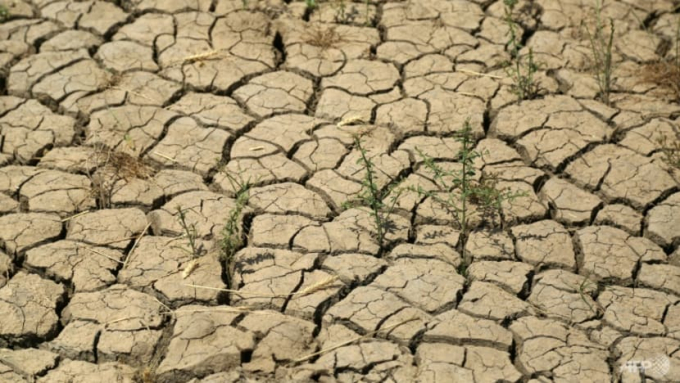November 28, 2025 | 01:06 GMT +7
November 28, 2025 | 01:06 GMT +7
Hotline: 0913.378.918
November 28, 2025 | 01:06 GMT +7
Hotline: 0913.378.918

After decades of war and insurgency, Iraq faces another huge challenge: Severe water scarcity driven by climate change. Photo: AFP
"The drought is unbelievable," said the 53-year-old in a white dishdasha robe and keffiyeh head covering at his farm in Jaliha village of central Diwaniya province.
"Even the well water can't be used, it's salt water."
Searing heat and a lack of rain were already threatening his harvest. Then came Russia's invasion of Ukraine in February, driving up the cost of fuel, seeds and fertiliser.
Like all farmers in Iraq, Hamed must follow the instructions of the state authorities who are the main grain buyers.
They determine the areas to be planted and the level of irrigation, depending on rain and water reserves. This year, due to water shortages, Iraq has reduced the area under cultivation by half.
As a result, Hamed has planted just one quarter of his 100 donums (10 hectares), where the combine harvester was now throwing grain into a truck bed.
"This year we didn't even get 500kg of wheat from one donum" - less than half the usual harvest - he said.
The war in Ukraine has "pushed up the price of motor oil and of high-yield seeds", he added - yet "another financial burden for farmers".
"I don't know how to support my family. No salary, no job, where can I go?"
ABANDON THE LAND
After decades of war and insurgency, Iraq faces another huge challenge: Severe water scarcity driven by climate change.
It is highly sensitive issue for Iraq and its 41 million people, who feel the impacts on a daily basis, from depleted rivers to rapid desertification and more intense sandstorms.
Iraq's big rivers, the Tigris and Euphrates, and their tributaries originate in Turkey and Syria as well as Iran, which dam them upstream, reducing the flow as they enter Iraq.
Irrigated by the Euphrates, Diwaniya province, where Jaliha is located, normally receives 180 cubic metres of water per second.
This year the volume has been at least halved to "80 to 90 cubic metres", said Hani Shaer, who heads a farmers' collective responsible for distributing the water.
The result can be seen in the stagnant water in the main irrigation canal, which serves the 200,000 donums of surrounding land, with some gullies now completely dry.
Shaer denounced a lack of support from authorities, charging that the agriculture ministry provided just 5kg of fertiliser this season, down from 40kg in previous years.
"The farmer will leave, abandon the land and head to the city to look for any kind of work," he said.
COLLAPSED HARVEST
Agriculture ministry spokesman Hamid al-Nayef said the state was helping by raising the purchase price in order to pay producers around US$500 per tonne of wheat.
In 2019 and 2020, wheat harvests had reached 5 million tonnes, enough to guarantee "self-sufficiency" for Iraq, he told AFP.
This season, Iraq may only grow 2.5-3 million tonnes of wheat, "not enough for a whole year for the Iraqis," Nayef acknowledged.
"We will have to import," he said.
Iraq will be confronted with the vagaries of the world market and prices driven up by the conflict in Ukraine, even though Baghdad imports its cereals mainly from Canada, Australia and the United States.
"With the interplay of supply and demand, prices are rising even in the United States and other countries," Nayef said.
Back in Jaliha, another farmer, Ahmed al-Jelhawi, was questioning his life choices. He said he used to harvest 500 tonnes of wheat, but this year expects just 50-75 tonnes.
"I gave up my studies to devote myself to agriculture," he lamented. "But this year, agriculture is zero."
"Between the low production and the rising prices, we probably won't be able to plant next year."
(AFP)

(VAN) A new study reveals how the simultaneous effects of ocean acidification, salinity and loss of oxygen are making the world more fragile.

(VAN) Hopes are growing that the creation of the first 3D turkey gut model could be a turning point in the battle against the virulent blackhead disease.

(VAN) Tyson, America’s biggest meat supplier, plans to shutter one of its largest beef processing plants as the industry continues to struggle with low cattle supplies and political pressure from Washington.

(VAN) New FAO study shows how digital solutions are empowering farmers and fishers to prevent losses and build resilient agrifood systems.

(VAN) Brazil's COP30 presidency pushed through a compromise climate deal on Saturday that would boost finance for poor nations coping with global warming but that omitted any mention of the fossil fuels driving it.

(VAN) Poultry farmers in the UK have been warned that they could face one of the worst winters yet for bird flu.

(VAN) Prices of main-crop paddy have risen sharply, with jasmine rice hitting 16,100 baht per tonne — the highest level in years.